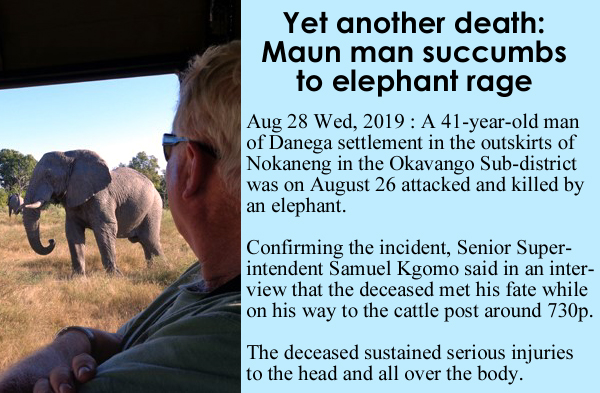 When’s the last time that you unpacked your cart as the check-out teller balled you out for buying plastic bags for clogging up the environment?
When’s the last time that you unpacked your cart as the check-out teller balled you out for buying plastic bags for clogging up the environment?
We just experienced a similar thing in Botswana. Not with plastic bags but with elephants.
“I didn’t vote last time,” one of the younger managers of a Botswana camp famous for its elephants told me, “but this time I absolutely will. There are too many elephants.”
Every single guide we had in all three camps made it a point to tell all my clients the same thing.
On October 23 the country has a national election in which elephants play a notable role in the candidates’ differences.
The current president who a year ago looked very vulnerable has spent a good amount of time ranting and raving about elephant damage in the country. He has increased the country’s alliance with Zambia and Zimbabwe to get CITES to loosen the ban on ivory trade and based on conversations with our guides and staff, he’s hit a home run.
There are too many elephants, no doubt about it.
Just outside Makgadikgadi national park we saw seven elephants but the tracks of dozens more. They were almost all male. I’ve seen that in other relatively small areas like this one: at the entry to Luangwa National Park in Zambia and at the entry to Tarangire National Park in Tanzania.
In both those cases the males broke traditional behaviors to hang out together, and … raid farms, and I’ll bet you dollars-to-donuts that’s what they were doing here. The raids here, however, weren’t for watermelon and squash as in Tanzania, or maize as in Luangwa, but for grass and shrubs that local villages need for their goats and cattle.
Rebecca from a small NGO, “Elephants for Africa,” told us one evening in camp that there might be other reasons for this unusual percentage of male elephants, but she gave no suggestions and the comparisons with Luangwa and Tarangire are too stark.
Her organization was supported by our camp to try to help local farmers figure out ways to keep the ele out of their farms and homes. All the methods she listed have long ago proved mostly ineffective, and I think soon the folks around here will realize it.
They’ll begin to wonder why the camp across the river from their homestead is promoting such nonsense. The time is coming in a place like Botswana where the culture moves away from big-game friendliness.
Like all the NGOs I know, big and small, when they realize that there is no easy way to contain elephants, they flip the reality that elephants are threatening people, to people threatening elephants.
People are threatening to elephants but not for the implied reason of poaching, and not completely from habitat erosion, either, which is the alternative cockamamie rant. The real threat to elephants is that they will be democratically voted out of existence.
This made little economic sense in years past. Tourism in most of the African countries where visitors travel to see elephants has until recently contributed too significantly to the economy.
But it’s sort of like Ducks Unlimited. Wager enough funds on the environment used by ducks so that you can kill them. In this case it’s more terrible: Tourism revenue is a bribe to protect the elephants that are destroying people.
It’s no surprise that Botswana’s where this is all coming to a head. The country is a bit different economically than most other African countries where at some point in their history tourism was the principal source of foreign funds. Tourism has always played second fiddle to mining in Botswana.
But more to the point, that gap between tourism and mining in Botswana is widening much more quickly and radically than anyone would have suspected. Diamonds and rare earths including uranium now dwarf tourism for economic importance.
And there are more elephant in Botswana than in any other African country. (Tanzania is a close second and is contemplating adopting many of Botswana’s mitigating measures for elephant danger that has so infuriated NGOs recently.)
Moreover there are many fewer people in Botswana than most African countries but they are significantly better educated.
Botswanians are confident of their country’s future and certain that protection of the Botswana citizen should rank way ahead of the elephant. Right now they don’t feel that’s the case.
Will young people in the tourism industry be willing to alter their careers if necessary?
I have no doubt about it.
It’s near impossible to convince American suburbanites to not cull deer. I’ve tried. There are sanguine arguments for leaving deer alone but the rose hedge trumps me every time. Get a bit deeper and the arguments rocket into the stratosphere of reality, where CWD or lyme disease supposedly threatens whole cities! Now imagine if we weren’t discussing deer, but elephants!
As I see it foreign tourism thrives on punishing the local Botswana farmer and homemaker. If conservationists don’t get beyond their fund-raising obsessions and patent lies about the catastrophic threat caused by poaching and admit this to the world, I see a terrible collision occurring soon.
In a breath this country’s historic protection of wildlife will disappear. The outcome of the October 23 election will be an important marker.